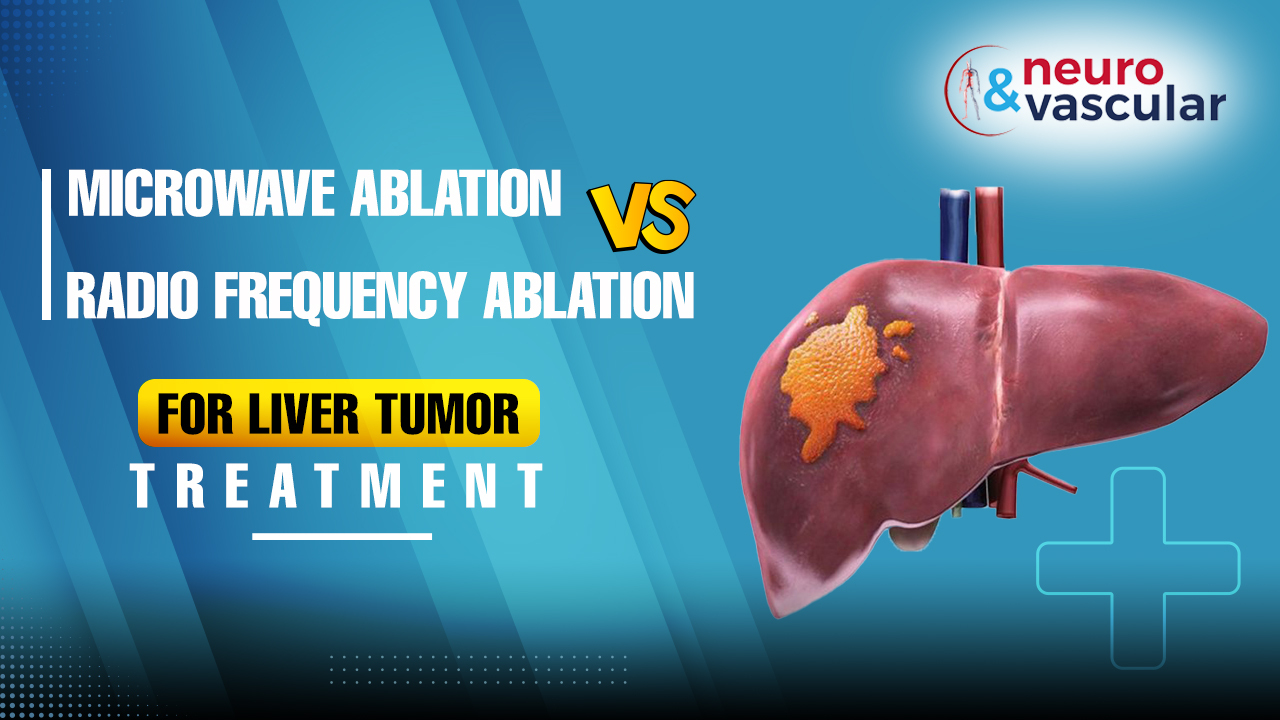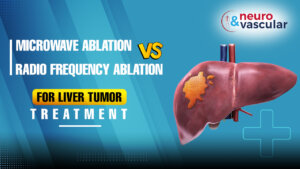
Microwave Ablation vs. Radio Frequency Ablation for Liver Tumor Treatment

Introduction
When it comes to liver cancer, there are two types of liver cancers: primary and secondary. Primary liver cancer treatments in Hyderabad begins in the organ itself. At the same time, secondary liver cancer originates from another organ but affects the liver. To get a proper treatment on liver cancer it depends on several factors. Such as tumor size, number of lesions, distribution, metastasis, lymph nodes, patient’s health, and liver transplant feasibility. Surgical removal and liver preservation are recommended for small tumors unless transplantation is necessary. Alternatively, less invasive options are available, including cryoablation and thermal ablation techniques. Microwave ablation and radio frequency ablation are the part of this thermal ablation techniques.
Cryoablation freezes malignant cells, while thermal ablation techniques utilize heat. The two main types of thermal ablation for liver cancer are Radio Frequency Ablation (RFA) and Microwave Ablation (MWA). RFA, using radio waves, has proven its effectiveness globally for the past two decades. However, recent clinical studies suggest that MWA is faster equally effective. The choice between the two methods is typically based on the lesion (tumor) characteristics.
A revolutionary treatment of liver cancer:
Effective and low-risk treatment for liver cancer is possible through radiofrequency ablation if the cell growth measures 4 to 5 cm or less. Alternatively, microwave ablation offers even better results for the same issues with shorter procedure duration, higher temperature, and a larger ablation zone. This procedure allows for the use of multiple probes and minimizes heat dissipation through the liver.
What is Radiofrequency Ablation?
Radiofrequency Ablation (RFA) is a non-surgical treatment option that can effectively eradicate tumors and offer hope to patients with early-stage cancer.
Using alternating current and RF waves, RFA targets tumors by generating heat that destroys cancer cells. This technique has been widely recognized as a safe and effective treatment for various cancer types. These include hepatocellular carcinoma and liver metastases.
The success of RFA largely depends on tumor size and location. Studies have shown that tumors smaller than 3 cm can achieve a complete response rate of over 90%. Even tumors ranging from 3-5 cm can be significantly ablated, with success rates ranging from 50-70%. However, for larger tumors over 5 cm, RFA may not yield optimal results.
What are the advantages of Radiofrequency Ablation (RFA)?
RFA is one of the most established and trusted thermal techniques. Many radiologists use this non-surgical treatment option for the treatment of liver cancer to get the best result. RFA offers unrivaled effectiveness, feasibility, and safety. RFA can be used as a standalone treatment for non-surgical patients or as an adjunct to resection for resectable lesions. It can be applied to inoperable tumors with a positive response to chemotherapy or recurrent tumors.
What are the limitations of RFA?
When it comes to treating large lesions of the liver, multiple overlapping ablations may be necessary for optimal safety. While recent reports suggest that treating sub-capsular or high-risk nodules doesn’t increase complications, their position can still pose a challenge for RFA. Additionally, tumors near large blood vessels may not be effectively treated due to the heat-sink effect. Patients can feel discomfort or mild pain in nearby cancer spread areas. The doctor gives you painkillers to avoid the pain.
Must read: Interventional therapies for Liver Cancer
What is Microwave Ablation?
Microwave ablation (MWA) is a medical procedure that uses microwave frequency to heat and destroy tissue. It utilizes frequencies between 900-2,500 MHz. MWA causes the molecules in tissue to oscillate and increase their temperature. Unlike other ablation methods like radiofrequency ablation (RFA), microwave ablation of liver tumors directly heats the target tissue through an antenna inserted into the body. This allows for the effective treatment of even low electrical conductivity or high impedance tissues. With the ability to generate high temperatures quickly, MWA can improve treatment outcomes and create larger ablation areas.
Compared to RFA, early-generation MWA has been shown to be equally effective and safe. Recent technical advancements have allowed for the treatment of larger areas. That can be beneficial for tumors equal to or larger than 3 cm. The most recent MWA devices have comparable mortality and significant complication rates to RFA.
Must read: Liver Biopsy Procedure
What are the Advantages of Microwave ablation (MWA)?
MWA gives more advantages over RFA. With MWA, you can expect a higher intratumoral temperature, deeper energy penetration, and the ability to overcome poorly conductive tissue barriers. You don’t have to go through the heat-sink effect. These unique capabilities allow the safe treatment of larger tumors and nodules near large vessels. Plus, MWA eliminates the need for grounding pads.
Patients may feel uncomfortable during treatment and have a minor increase in body temperature for a few days following the surgery. Additionally, although it happens seldom, the needle insertion has a mild risk of bleeding. Rest assured that throughout your therapy, your doctor will keep a careful eye on your condition.
Conclusion
Thermal ablation therapies are revolutionizing liver cancer treatment. These therapies are minimally invasive, well-tolerated, and complication-free approach to fighting the disease. RFA has long been the go-to technique. MWA has proven to be just as effective, faster and safe with more broader indications. With these many choices, find the perfect thermal treatment for your needs by consulting with interventional radiologists and achieve the best possible outcome for your liver cancer treatments in Hyderabad.
About the Author:

Name: DR . SURESH GIRAGANI
INTERVENTIONAL RADIOLOGIST
DR. SURESH GIRAGANI CONSULTANT INTERVENTIONAL RADIOLOGIST at Apollo hospitals Jubilee Hills has more than sixteen years of clinical experience in vascular interventions with a special interest in neurovascular and peripheral vascular disease interventional procedures.